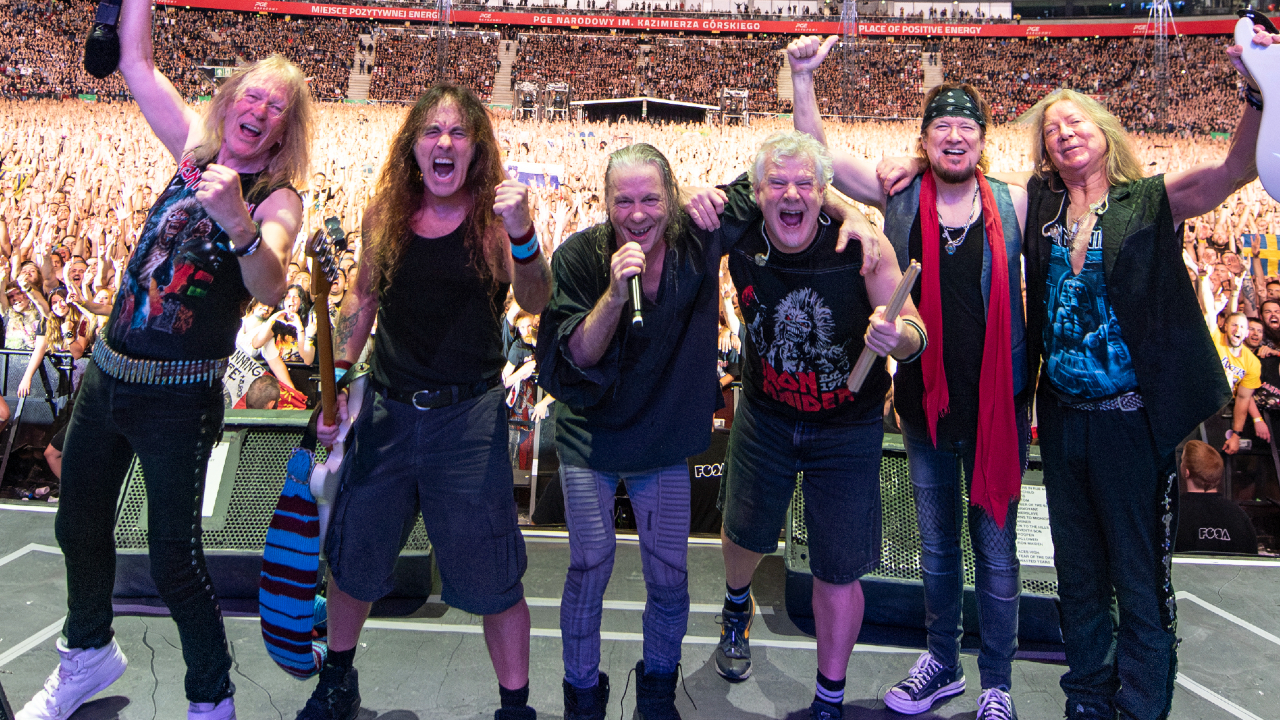Flames, fetishes and pickled babies: the twisted story of Rammstein‘s Mutter
How Rammstein’s third album, Mutter, took them from cult band to global metal superpower
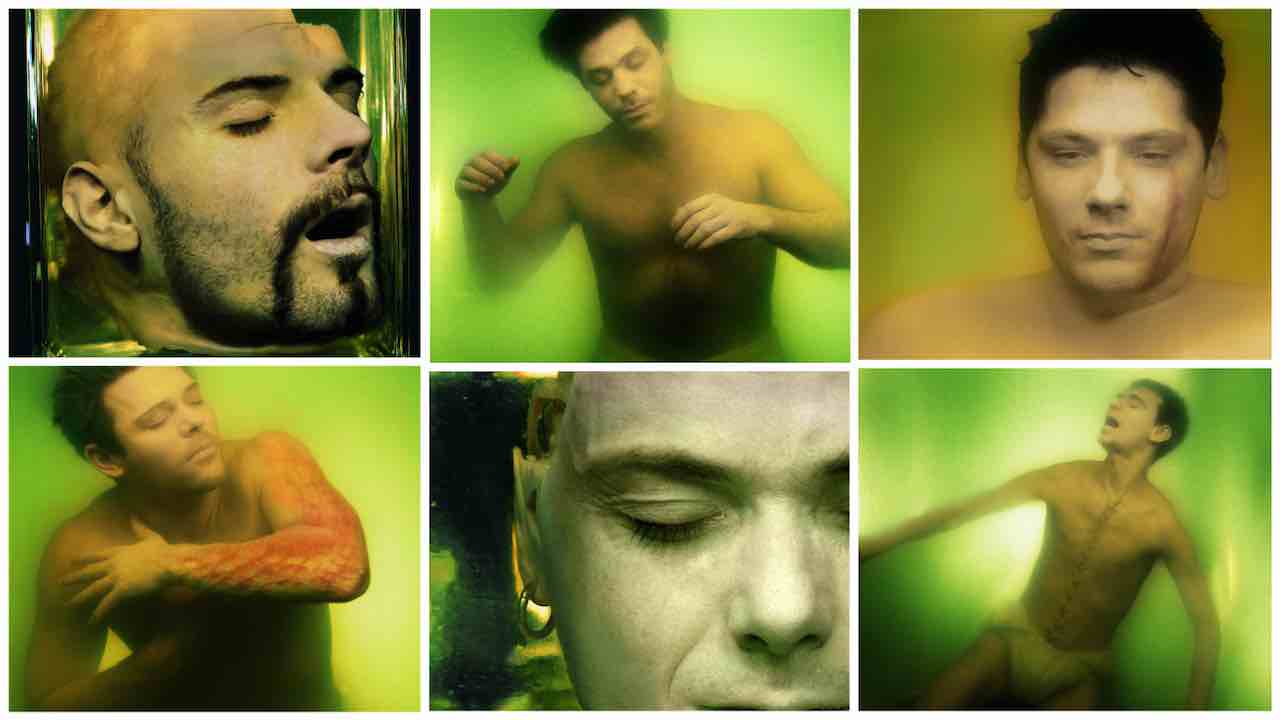
Select the newsletters you’d like to receive. Then, add your email to sign up.
You are now subscribed
Your newsletter sign-up was successful
Want to add more newsletters?

Every Friday
Louder
Louder’s weekly newsletter is jam-packed with the team’s personal highlights from the last seven days, including features, breaking news, reviews and tons of juicy exclusives from the world of alternative music.

Every Friday
Classic Rock
The Classic Rock newsletter is an essential read for the discerning rock fan. Every week we bring you the news, reviews and the very best features and interviews from our extensive archive. Written by rock fans for rock fans.

Every Friday
Metal Hammer
For the last four decades Metal Hammer has been the world’s greatest metal magazine. Created by metalheads for metalheads, ‘Hammer takes you behind the scenes, closer to the action, and nearer to the bands that you love the most.

Every Friday
Prog
The Prog newsletter brings you the very best of Prog Magazine and our website, every Friday. We'll deliver you the very latest news from the Prog universe, informative features and archive material from Prog’s impressive vault.
The headline screamed, ‘Nazis? Heil no!’ This wasn’t one of the usual outrageous tabloid rags, though – this was a mainstream UK music publication. Why? The year was 1998 and a band had used footage of Leni Riefenstahl’s 1938 film, Olympia, in their latest music video – a cover of Depeche Mode’s Stripped. While originally created as propaganda for the infamous ‘Nazi Olympics’, the movie is now routinely name-checked as a vital moment in cinematic history. But the band in question were German, sparking fears of fascism.
It was Rammstein: the Berlin six-piece who’d lived under hardline socialist rule in the German Democratic Republic. The staunchly liberal band. The band with the fire. The band with the dildos. But Britain didn’t know all that yet…
“We are not Nazis, Neo-Nazis, or any other kind of Nazi,” said the band emphatically in a statement quoted in the piece, stating that the footage was used as an example of good art. “We are against racism, bigotry or any other type of discrimination.”
It was a strange start for a band who were about to embark on an effort to win over Britain. “They were convinced it would never happen in the UK,” says Anna Maslowicz, the PR guru who took Rammstein under her wing a year or so after that headline. “The first time I met them, I said, ‘You’re gonna be playing stadiums in the future.’ And they said, ‘Never. We’ll never be accepted here. We sing in German.’”
That admission seems surprising in light of how things were going for the band. While their debut album, 1995’s Herzeleid, flopped onto CD players and was met with a somewhat flaccid reception, it caught the ear of Nine Inch Nails’ Trent Reznor and filmmaking legend David Lynch – they loved it so much, two songs ended up on Lynch’s 1997 neo-noir cinematic nightmare, Lost Highway.
Album Nummer zwei, Sehnsucht, booted the door down later that year. Its lead single, Engel, reached No.3 in the German singles charts. Up next was Du Hast, now a setlist staple, which somehow became a US radio hit and pipped The Smashing Pumpkins to a heavy rotation slot on MTV.
They were playing to thousands of devotees in mainland Europe and blowtorching a serious reputation across the pond. Thorsten Zahn, former editor of German alternative magazine Visions and the current editor-in-chief at Metal Hammer Germany, was sold hook, line and sphincter from day one. But as Rammstein hunkered down to make the album that would become Mutter, a seed of doubt sprouted in his brain: how could the band exceed expectations again?
Sign up below to get the latest from Metal Hammer, plus exclusive special offers, direct to your inbox!
“Everyone was afraid which direction they’d go next,” he says of the band’s Deutsche fanbase. “Everyone was nervous that the third record would turn out bad.”

There was one man who definitely wasn’t nervous: Jacob Hellner. The Swedish producer had already worked with the band on Herzeleid and Sehnsucht, and would continue to produce every record save for 2019’s self-titled. He remembers the mid-1999 gestation period of Rammstein’s defining chapter.
“[With] how the music world worked back in those days, your third album would define whether you were there to stay or just a flash in the pan,” he explains. “They realised that, and even though they’d had massive hits with Sehnsucht, they still had the bravery to follow their artistic instinct and go where they went.
“They rented Haus Weimar in Heiligendamm, a small town by the Baltic Sea,” he continues. “It was a hangout for the East German political top brass, and in those days, it was really worn down – they rented the caretaker’s house. The whole foundation of the album was laid out in that house.”
Aside from the presence of a minor celebrity – the German Shepherd who played Hitler’s dog in 2004’s Downfall, if you were curious – these sessions were unremarkable and workmanlike. The next year saw Rammstein road-test pretty much the entire album at a fan club gig in Berlin, before recording the tracks in France’s Studio Miraval.
Musically, it was a definite swerve from the hyperactive, videogame-ish industrial metal of albums prior. Mutter’s grandiose chuggery was accentuated with the help of the Deutsches Filmorchester Babelsberg, whose swelling strings run through the title track, Mein Herz Brennt and Nebel. Jacob had a very specific, very German target in mind for the sound: Richard Wagner. But there was nearly a cock-up.
“I’ve always had a soft spot for when they did that kind of drama, which was possible in the slower and mid-tempo stuff – there was more space to really go into those colours,” he says. “The orchestra was a high and low point at the same time. We’d been recommended someone to transpose it – these notes by the cellos, these by the violas, and so on. We had this enormously expensive orchestra come into this enormously expensive studio [Studio Saal 1, Berlin], and when they started to play the music, it just sounded strange. Really awkward. We were so fucking stressed out, and not until we’d done that for two or three hours did we realise that this transcription guy had changed stuff – he’d changed the arrangements! We convinced the orchestra to come back the next day, and the guy spent all night redoing it.”
Once recorded, Jacob mixed Mutter alongside Stefan Glaumann and hashed it out with the band, often for hours at a time. “The post-production discussions became quite heated, with various camps – me included – taking sides and trying to convince the other half whether a particular track should be included or not!” Jacob laughs. “That’s their strength. They can have these never-ending discussions and end up with Rammstein.”
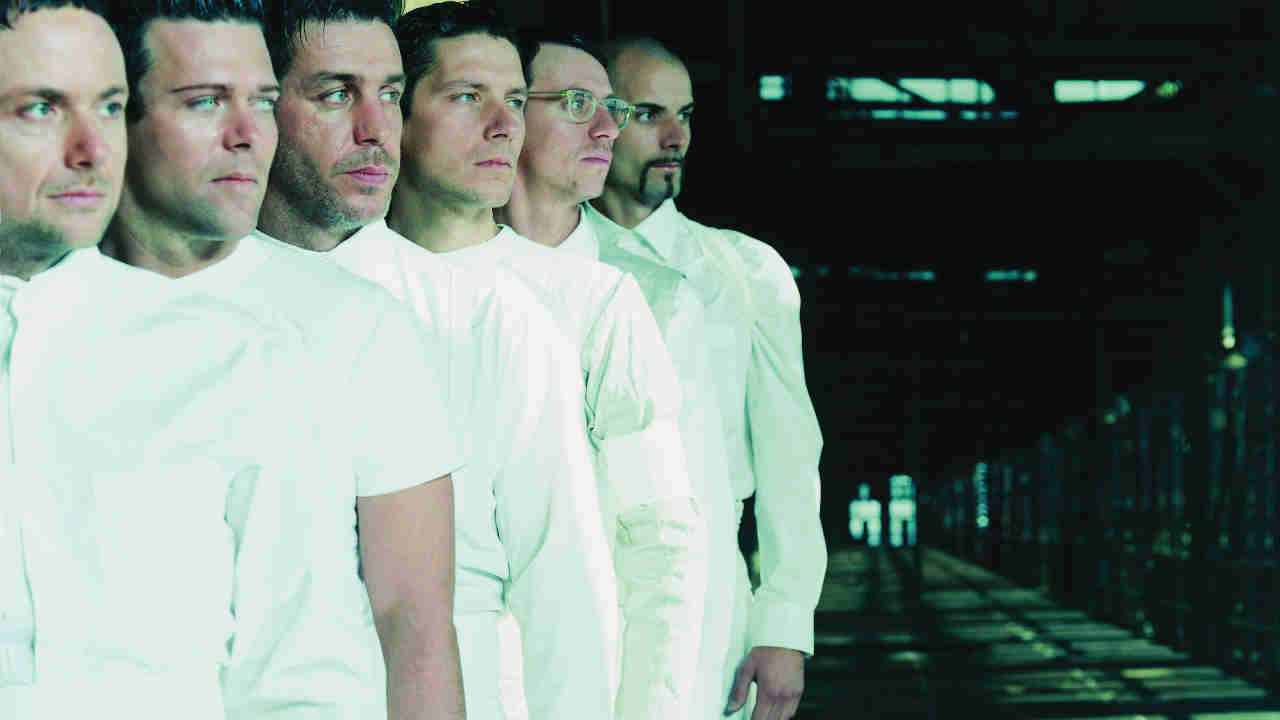
The focus fell on acoustic-sounding percussion locking into those regimented, mechanical riffs – something else Jacob appears to have had a hand in.
“Composition-wise, Jacob is a very important key in the chain – that was a role not many people got to see, except the band,” says Ronald Prent, the mixing engineer responsible for Rammstein’s core sound on Herzeleid and Sehnsucht, who also oversaw preliminary Mutter mixes in June 2000. “The band has great ideas, great riffs, and Till [Lindemann, vocals] writes amazing lyrics and controls the German language like no other… but Jacob was the common denominator that brought it together into a song.”
Speaking of the German language, on the run-up to Mutter’s release, Anna was preparing a proper push for Rammstein’s PR campaign in the UK. Before this, the band had only played one UK show, at London’s Powerhaus in 1997. Essentially a pub, the venue bore witness to Till taking the stage with laser goggles before setting himself on fire. One publication gave it three out of five. Rammstein needed someone to give a shit.
“At the start, they did all the interviews using a translator,” says Anna. “Christoph and Paul [Schneider and Landers, on drums and guitar respectively] came over and did interviews. People felt a bit uncomfortable, so I explained that English wasn’t their first language, and it shouldn’t be a hindrance – they shouldn’t not be able to do press because they can’t speak perfect English. I think, because of that piece [with the Nazi headline], they didn’t want to be misunderstood or misquoted.
“The only hard bit was persuading people about interviews with a translator,” she continues. “People were aware of them, but they hadn’t really come to the UK and done anything. People needed access to them – be exposed to them – for them to progress in the UK.”

On April 2, 2001, Mutter was born. The baffling, Snow White-themed music video for lead single Sonne had been doing the rounds on music television, and before anyone could fully sink into Mutter’s musical embrace, they had to look at that cover. Photographed by German couple Daniel and Geo Fuchs, it frames the vulnerable, heartbreaking image of a dead foetus preserved in formaldehyde.
“The cover was a big scandal in Germany, as everyone said, ‘You cannot show a dead baby!’”, recalls Thorsten, who’d just started as editor at Metal Hammer Germany. “Then they said, ‘Well, is it really dead? Is it not dead? Are you allowed to show a dead baby on the front cover of a major record?’. Then you saw the photos of all the guys in the liquid too. This was something that they directed. They wanted it. They’re a magnet for provocation.”
No matter what people thought of the artwork, Mutter’s sonic content was too explosive to deny. As with every Rammstein record, it comprises 11 songs – they sprint across a 45-minute run-time, spattering the music and lyrics further across the canvas than ever before. The riffs hit harder, the vocals more commanding, the drums punchier, the keys dripping with sorrow and silliness in equal measure. It was Rammstein 2.0, and with Ich Will, Feuer Frei!, Sonne and Links 2 3 4, it had absolute tunes for days. Irrefutable proof that they had more in their locker than just Du Hast and a worn-out strap-on.
“Fucking hell, it is… bangers,” says Winston McCall, vocalist of Parkway Drive – a band whose fire-fuelled live show is indebted to the Germans’ onstage chaos. “I’m hooked from the word ‘go’. Mein Herz Brennt, as an opening track, sets the tone so well. The grandness straight-up, the strings coming in straight away, then the female vocalisations coming in the whole way through the record, tying it with that whole Mutter theme – it’s fucking genius.”
For Winston, an Australian, the maternal theme is more apparent through the music. But for Thorsten, and German listeners at large, Mutter was more than thematic – its effect was profoundly literal. “A record called Mutter – ‘mother’ – is a pretty strong expression,” Thorsten elaborates. “[Most people] have a very special relationship to their own mother, and if you like this band and the sound they put on a record called Mutter, all of a sudden you have a special relationship to this record.
“The diversity of the songs made this pretty intense,” he continues. “Links 2 3 4, that’s where they show their political views – they do left-wing lyrics with a marching military beat. When Till sings ‘Sie wollen mein Herz am rechten Fleck / Doch sehe ich dann nach unten weg / Da schlägt es links / Links’ [translated loosely as ‘They want my heart on the right spot / But then I look below it beats left there / Left’], for a German audience, it is crazy to hear. Then you look down at yourself and see that your heart too beats at the left side. Everyone’s does.”
Elsewhere, the band venture into gentler territories – the aforementioned title track and Nebel, the record’s coda, achieve the melancholy balladeering the band hadn’t quite nailed on previous outings. For the latter, Rammstein re-enlisted Bobo: the singer whose syrupy vocals made Engel such a hit four years prior (see “I was touched by its timeless beauty”, right). Here, though, she’s slight – almost hidden, an Easter Egg for anyone listening properly. After banging your head and thumping your thighs like Till does onstage, it’s almost a relief… until you cotton on to what the song’s about.
“It’s a fog in the morning, and it’s about this relationship between two older people,” says Thorsten. “She will obviously die, and this is the last kiss she will get from him. It’s so intense – you can really cry to it.”

Mutter was more significant than just a piece of plastic on a CD deck or turntable. Sure, reviews were a bit middling, and people still used Nazi puns that went out of fashion at the same time as the Third Reich. But the album instantly topped the charts in Germany, Austria and Switzerland. Of its five (five!) initial singles, Ich Will and Feuer Frei! crept into the UK Top 40. Clearly, somebody liked it. For the fans, this was the moment Rammstein became more than just a band – they were now something you had to consume, experience, live and breathe. It was a phenomenon the press couldn’t ignore any longer.
“I’ve never had so many industry people blag tickets off me for shows,” laughs Anna, who has counted the likes of Nine Inch Nails and Blink-182 as PR clients. “We concentrated on the rock press for the actual interviews, but for the live shows, we went, ‘Right, let’s invite the NME, let’s invite all the broadsheets.’ And the reviews were just amazing – ‘You’ll never see a show like this, it’s next level.’ It’s so much more than a live show.”
Covering more than 100 dates between May 2001 and July 2002, the Mutter tour brought Rammstein’s musical step-up to life, flinging them from theatres to arenas in most territories. Kitted out with lifeless tiles to conjure images of an old-fashioned, East German delivery room, the show started with the band’s keyboard player, Flake, at his instrument.
“We’d had an old dentist’s chair repurposed for me to use as a keyboard stand, and I wore a white doctor’s coat,” he writes in his book, It’s The World’s Birthday Today. “Tom [Morawetz, the band’s long-term tour assistant] came up with the idea of pinning a blood bag to it. Lord knows where he got hold of that.”
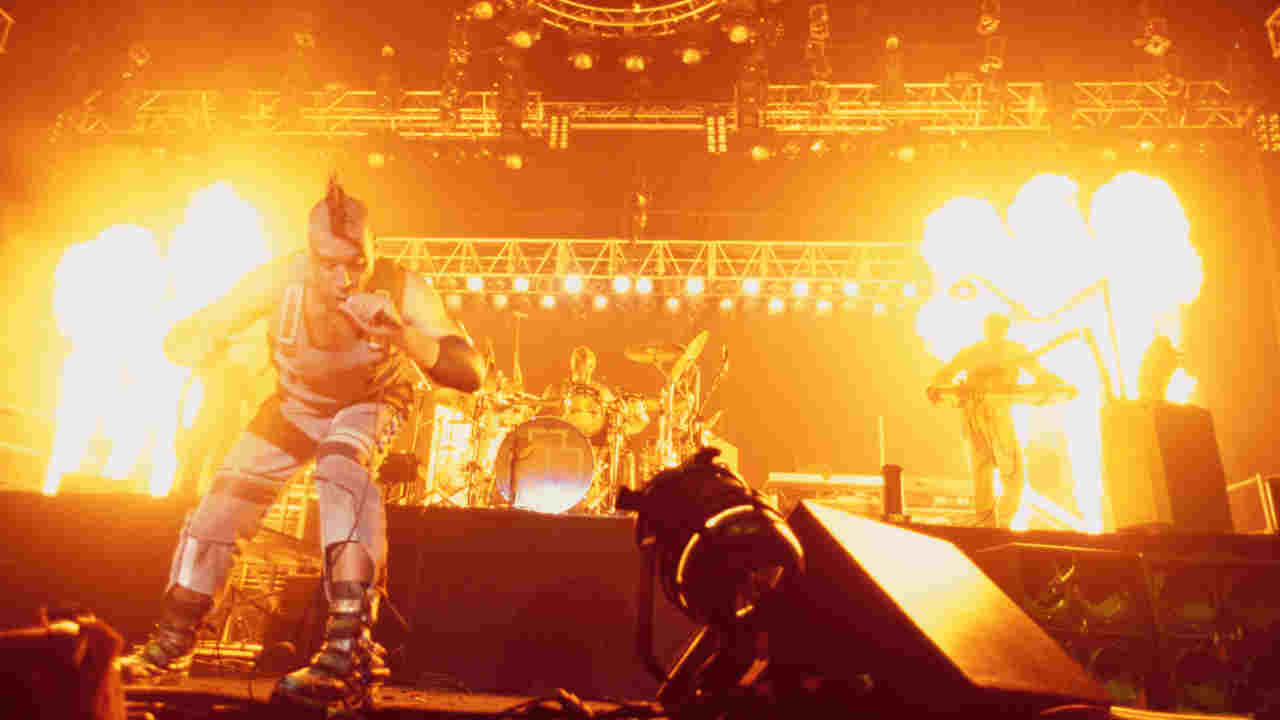
From there, he started fingering the ghastly opening to 5/4, one of Mutter’s criminally overlooked B-sides. A massive, red, pulsating uterus descended from the venue’s ceiling.
“I designed a huge uterus that they came out of,” LeRoy Bennett, an A-list lighting and production designer, told Hammer in 2019. “The birthing canal they were coming out of was a tube that was used for escaping out of a fire, and it had fireproof webbing on the inside that zig-zagged through it. Normally you’d have clothes on while going down it, but because they were coming through in diapers, their skin would get web-burned, so we had to cut the tube short so they could slide out easier.”
It was a swerve into the absurd on an unprecedented scale, larger than life and completely one-off. Just six years prior, they’d supported Swedish rap metallers Clawfinger in 500-capacity clubs. Now Rammstein’s fortunes had changed, they returned the favour and offered the Swedes a support slot.
“When Mutter came, it was like a new definition of heavy,” says Clawfinger’s co-founder and keyboard player, Jocke Skog. “We only realised [how popular Rammstein had become] when we came to the first show of the tour and saw this incredible, huge spaceship theatre going on, and it was to, like, 20,000 people! They told us, ‘We’ve put 80% of all the money we make back into this tour.’
“They had huge bangs going on – we could feel it when we were sat eating in catering,” he details. “It was like an old American action movie with bombs, explosions and absolutely no plot. I’ve always been a tech geek too, and they had two full-sized Apple computers, with one for backup. We were standing in one of those 20,000-capacity venues, you can hear the birth of the band, then suddenly it’s pitch black. Silence, for 30 seconds. We looked at each other like, ‘Holy fuck, the computer died!’ The audience was like, ‘Are we supposed to clap now?’ Then suddenly, Mein Herz Brennt starts. I asked what the fuck happened, and they were like, ‘Yeah, the first computer broke, then the second one broke, so we had to restart the whole thing – fuck the intro.’ One guy was still hanging from the uterus, ha! It was like, ‘BLACKOUT, REMOVE EVERYTHING, GET THEIR CLOTHES ON!’”
Hold-ups in the ute-chute aside, the Mutter tour seemingly went off without a hitch. Even the postponement of Rammstein’s much-hyped London show couldn’t dent their momentum – the local authorities pulled their gig at the 2,000-capacity Astoria at the last minute due to safety concerns, but it was rearranged for later in 2001, at the much larger Brixton Academy. The album only peaked at #86 in the UK charts, but you can’t stand between the British public and a concert where the singer pretends to spunk all over the keyboard player.
“After that first media run, they never looked back,” says Anna. “The UK embraced them.”

Everything was finally happening, until it wasn’t. A September/October US tour supporting Slipknot and System Of A Down was cut short for Rammstein, due to inter-personal tensions compounded by the 9/11 terror attacks. Richard Kruspe, the band’s guitarist, actually saw the second plane hit. Flake packed his bags and headed home mid-tour. “We totally slipped into this wave of hysteria, and I found the frenzied atmosphere very frightening,” he said in 2015’s Rammstein In Amerika documentary.
They didn’t return to North America for nine years, and in that time, their legend grew there as it did around the globe. Because Rammstein are the only band to have ever done this – to make a success of uncompromising, industrial, German metal filtered through a transgressive, performance art lens. It’s best suited for Berlin bondage dungeons, not Olympic stadiums. So why were they playing Feuer Frei! in the opening scenes of blockbuster movies like xXx, warming audiences up for two hours of shit-housery with Vin Diesel?
“As far as Mutter goes, it is sloganeering done to fucking perfection – every chorus is literally, like, a line,” says Winston. “Everything about it is made to get into your brain, and it’s pounded in there by riffs that are fucking relentless. There’s always a lot of tongue in cheek with whatever Rammstein do, of course there fucking is, but this is the one where the seriousness of the art can’t be fucked with. That, accompanied by dudes shitting flames out of their faces.”
In 2021, it’s still watertight. Peter Tägtgren, the producer who’s worked with everyone from Immortal to Amon Amarth, Children Of Bodom and Till Lindemann himself, cites the record as a lesson in how the genre should sound. The singles are regular rock club staples, and still occupy a sizeable chunk of the setlist whenever Rammstein drag their macabre monolith of a show on the road. It’s endlessly replayable: the jewel in the band’s kinky crown.
Thorsten puts their success down to camaraderie. “They stayed together like a family,” he concludes. “Like best friends. Nobody from the outside can bring anything between them – they do everything by their own rules. They’re doing these super-huge pyros you never thought of in a stadium, artwork you never thought possible, lyrics people would go to jail for – you know what I mean? They try everything. No borders.”
Published in Metal Hammer #347
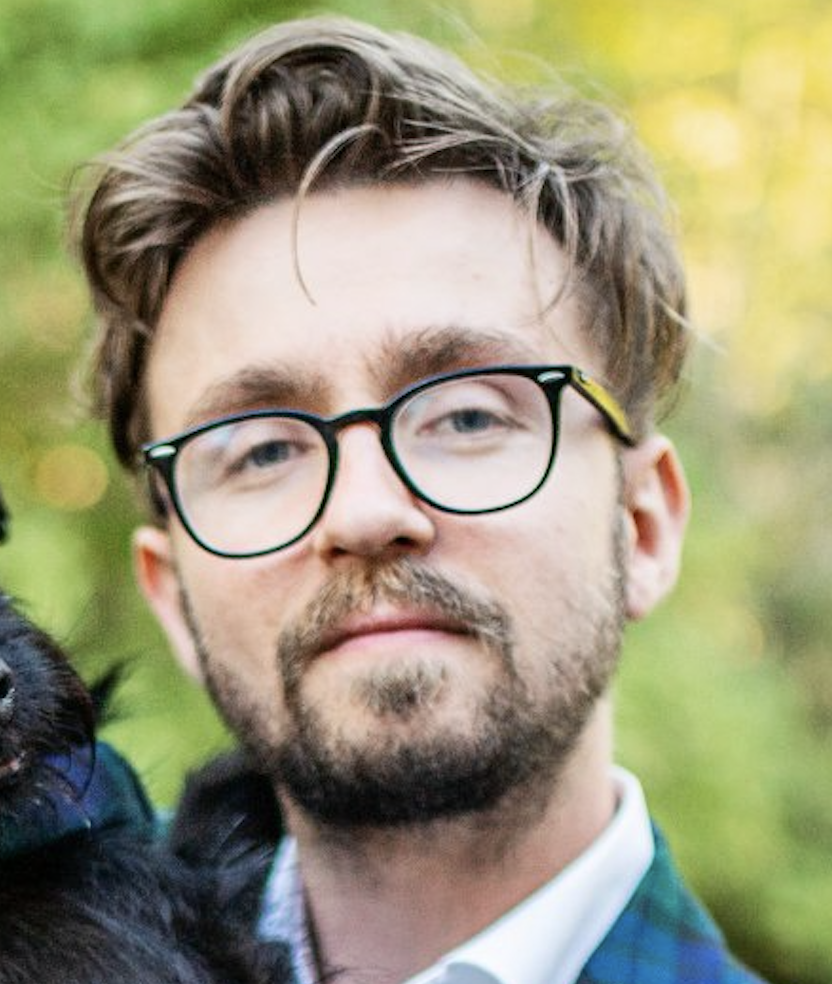
Alec is a longtime contributor with first-class BA Honours in English with Creative Writing, and has worked for Metal Hammer since 2014. Over the years, he's written for Noisey, Stereoboard, uDiscoverMusic, and the good ship Hammer, interviewing major bands like Slipknot, Rammstein, and Tenacious D (plus some black metal bands your cool uncle might know). He's read Ulysses thrice, and it got worse each time.

